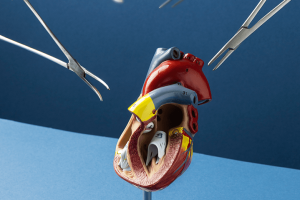The heart never takes a break. The heart is a strong muscle that never stops exercising, not for a minute. Every minute it needs blood, nourishment and oxygen. At Amarillo Heart Institute, we understand the importance of keeping your heart healthy and functioning at its best. We believe that a healthy heart is the foundation of a healthy life, and our goal is to provide you with all you need to achieve optimal heart health, a happier heart.
Heart Failure Clinic
The Heart Failure Clinic at Amarillo Heart Institute is a specialized medical center that focuses on the diagnosis and management of heart failure. The clinic includes a team of healthcare professionals, including cardiologists, nurses, and other specialists, who work together to provide comprehensive care to patients with heart failure.
The clinic offers a range of services, including diagnostic tests to help determine the severity and cause of heart failure. They also provide medications, lifestyle counseling, and other interventions to manage symptoms and prevent complications.
In addition, the clinic offers education and support services to help patients and their families understand the condition and learn how to manage it effectively. This includes information about dietary changes, exercise programs, and other lifestyle modifications.
Heart failure clinic services
- Diagnostic Tests:
- Medications
- Lifestyle counseling: Dietary changes, exercise programs and lifestyle modifications.
- Interventions to manage symptoms and prevent complications.
- Education and Support services
Overall, the goal of a congestive heart failure clinic is to provide personalized, comprehensive care to patients with heart failure, with the aim of improving their quality of life and helping them to live longer, healthier lives.
What is Congestive Heart Failure?
Congestive heart failure (CHF) is a condition in which the heart is unable to pump enough blood to meet the body’s needs. The term “congestive” refers to the accumulation of fluid that can occur in various parts of the body, such as the lungs, liver, and legs, due to the heart’s inability to effectively circulate blood.
The peripheral arteries are essential for delivering oxygen and nutrients to the tissues of the body. Examples of peripheral arteries include the brachial artery in the arm, the femoral artery in the leg, and the iliac artery in the pelvis.
Symptoms for Congestive Heart Failure
Although symptoms of congestive heart failure can appear suddenly, they usually come on gradually, over time.
Some heart failure symptoms are caused by fluid backing up in the lungs, abdomen, or extremities. Others reflect the heart’s reduced ability to deliver oxygen-rich blood to the body. Symptoms that persist or worsen despite treatment indicate that heart failure is becoming more advanced.
Heart failure symptoms can include:
Abnormal heart rhythm or palpitations
Chronic cough or wheezing
Decreased urine production
Difficulty sleeping
Fatigue or fainting spells
Feeling of fullness, loss of appetite, or abdominal pain
Fluid retention, which causes swollen extremities or abdomen (edema)
Loss of muscle mass
Nausea or vomiting
Shortness of breath upon exertion or when lying down
Sleep apnea
Weight gain
Patients diagnosed with heart failure who have been hospitalized at least twice in the past year should consider asking their doctors for a referral to Amarillo Heart Institute’s advanced heart failure specialists for an evaluation.
Treatment for Congestive Heart Failure
- Angiotensin-converting enzyme (ACE) inhibitors
- Angiotensin-receptor blockers (ARBs)
- Angiotensin-receptor antagonists combined with a neprilysin inhibitor (ARNi)
- Mineralocorticoid receptor blockers (aldosterone blockers)
- Beta blockers to lower blood pressure
- Digitalis drugs to regulate and strengthen the heartbeat
- Anti-arrhythmic drugs to regulate the heart rate
- Vasodilators to open arteries and improve blood flow
- Digoxin to stimulate the heart
- Diuretics to reduce water retention
- Quit smoking
- Avoid alcohol, caffeine, and stress
- Reduce fluid intake
- Reduce the amount of salt in the diet
Surgery/Invasive:
Angioplasty and Stenting: To improve blood flow in patients with coronary artery disease
Bi-ventricular pacemaker implantation: To regulate heart rhythm or help both sides of the heart contract at the same time
Cardioverter-defibrillator implantation: To regulate heart rhythm
Coronary artery bypass surgery: To improve blood flow in patients with blocked coronary arteries
- CardioMEMS: is a medical device used for monitoring heart failure in patients with chronic heart disease.
CardioMEMS - A monitoring system for heart failure
CardioMEMS is a medical device used for monitoring heart failure in patients with chronic heart disease. It consists of a small wireless sensor that is implanted in the pulmonary artery, which is a blood vessel that carries blood from the heart to the lungs. The sensor measures the pressure inside the pulmonary artery and transmits the data wirelessly to a receiver, which is placed outside the body.
The data collected by the sensor can help doctors monitor the patient’s condition and adjust their treatment plan as needed. By tracking changes in the pulmonary artery pressure, doctors can identify early signs of worsening heart failure and intervene before the patient experiences a serious health event.
The CardioMEMS device is typically implanted during a minimally invasive procedure that involves threading a catheter through a vein in the patient’s leg and up to the pulmonary artery. Once the device is in place, it can be monitored remotely by the patient’s healthcare team, who can access the data from anywhere using a secure web portal.
Overall, CardioMEMS is a valuable tool for managing heart failure in patients with chronic heart disease, allowing doctors to track the patient’s condition more closely and make informed decisions about their care.
Coronary Artery Disease: Narrowed or blocked arteries restrict blood flow to the heart muscle, leading to damage and weakening the heart muscle over time.
Hypertension (high blood pressure): Prolonged high pressure damages the heart and blood vessels, leading to heart enlargement and eventually heart failure.
Diabetes: High blood sugar levels can damage the blood vessels and nerves that control the heart, increasing the risk of heart disease and heart failure.
Cardiomyopathy: A disease of the heart muscle that weakens the heart and impairs its ability to pump blood effectively, leading to heart failure.
Certain heart rhythm disorders: Abnormal heart rhythms can weaken the heart muscle over time, leading to heart failure.
Advanced age: The risk of heart failure increases with age, as the heart becomes less efficient and more prone to damage.
African-American descent: African Americans are at higher risk for developing heart disease, which can lead to heart failure.
Chronic alcohol and/or drug abuse: Alcohol and drug abuse can damage the heart muscle and blood vessels, leading to heart failure.
Hyperthyroidism or hypothyroidism: Overactive or underactive thyroid gland can increase the risk of heart disease and heart failure.
Prior chemotherapy and/or radiation therapy for cancer: Some cancer treatments can damage the heart and increase the risk of heart failure.
Obesity: Excess weight can strain the heart, leading to heart enlargement and eventually heart failure.
Pulmonary hypertension: High blood pressure in the lungs can damage the right side of the heart and lead to heart failure.
Sedentary lifestyle: Lack of physical activity can weaken the heart muscle and increase the risk of heart disease and heart failure.
Previous heart valve disease: Damage to heart valves can strain the heart and eventually lead to heart failure.
Previous coronary artery bypass graft surgery: Previous heart surgery can increase the risk of heart failure.
Family history of heart failure: Genetics can play a role in the development of heart disease and heart failure.












